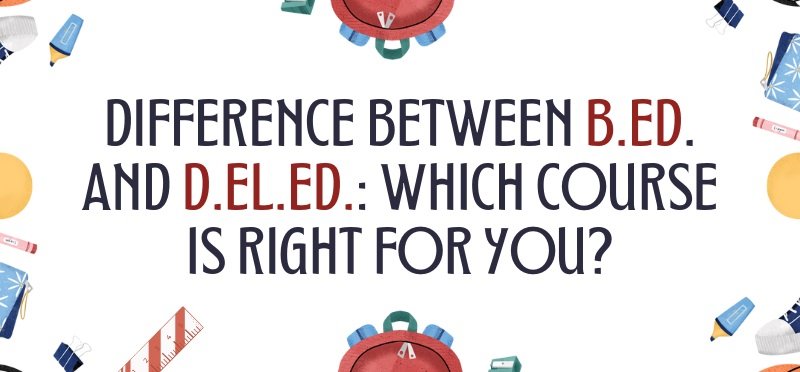
Difference Between B.Ed. and D.El.Ed.: Which Course Is Right for You?
Choosing the right teaching qualification can shape your entire career. With plenty of options available, it’s easy to get confused between courses like B.Ed. and D.El.Ed. Knowing the difference helps you pick the best path. Whether you want to teach young children or secondary students, understanding these courses can set you on the right track.
Understanding the B.Ed. (Bachelor of Education)
What is B.Ed.?
A Bachelor of Education, or B.Ed., is a college degree that trains future teachers. It usually takes about two years to complete. The program focuses on teaching methods, student psychology, and how to manage classrooms. It’s seen as a standard qualification to teach at higher levels, like secondary and higher secondary schools. Many find it essential if they want a stable teaching job or want to boost their teaching skills.
Eligibility and Admission Process
To join a B.Ed. program, you typically need a graduation degree in any stream from a recognized university. Some colleges also require a minimum percentage. The admission process might involve an entrance test, especially for government colleges. Along with the form, students submit academic records and birth certificates. Sometimes, interview rounds help universities select the best candidates.
Curriculum and Course Content
B.Ed. courses cover a wide range of topics. You will learn about teaching techniques, subject-specific pedagogy, and educational psychology. Practical training is a key part of the course, with internships in schools. This hands-on experience prepares you for real classrooms. You'll also develop skills in classroom management and assessment methods.
Career Opportunities with B.Ed.
Holding a B.Ed. opens many doors. You can teach in government or private schools, at secondary or higher secondary levels. Some choose coaching centers or work in educational content development. With a B.Ed., you can also go for higher studies like M.Ed., Ph.D., or special education courses. Many teaching jobs in India require a B.Ed. as a must-have qualification.
Advantages & Limitations of B.Ed.
A B.Ed. is well-recognized nationwide. It makes you eligible for government teaching jobs and provides chances to advance in your career. However, it usually takes two years to complete and often costs more than diploma courses. The longer study time might not suit everyone looking for quick entry into teaching.
Understanding D.El.Ed. (Diploma in Elementary Education)
What is D.El.Ed.?
The Diploma in Elementary Education (D.El.Ed.) is a short-term course designed for those who want to teach young children. It typically lasts one year, sometimes two, depending on the region. This diploma focuses on elementary education, mainly for primary schools. It’s perfect if you are interested in teaching children in their early years.
Eligibility and Admission Process
Most students need at least a 10+2 certificate or equivalent to apply for D.El.Ed. courses. Some institutes also require qualifying scores in state or national entrance exams. The application involves providing academic transcripts and filling out forms. The process is generally straightforward and quicker than university courses.
Curriculum and Course Content
D.El.Ed. emphasizes skills for teaching children aged 6 to 12. Topics include early childhood education, classroom behavior, and teaching basic reading and writing. Practical training is included, often through supervised classroom teaching. The course aims to build confidence in handling young students and managing primary classrooms effectively.
Career Opportunities with D.El.Ed.
Graduates find jobs mainly in government and private primary schools. With some experience and additional training, opportunities for promotion, such as senior teacher roles or supervisory positions, open up. Many also choose to pursue further education, like a B.Ed., later on.
Advantages & Limitations of D.El.Ed.
The biggest perk is the short duration and lower tuition costs, allowing quicker entry into teaching. It’s ideal for those who want to start working fast. However, D.El.Ed. is limited to primary education. It doesn’t qualify you for higher-level teaching roles or college-level jobs.
Key Differences Between B.Ed. and D.El.Ed.
Duration and Course Structure
- B.Ed.: Usually takes two years, covering extensive topics with practical teaching and theory.
- D.El.Ed.: Typically one year, focused mainly on elementary education skills.
Recognition and Qualification Value
- B.Ed.: Recognized nationwide; essential for teaching in secondary schools and higher education.
- D.El.Ed.: Recognized mainly for primary school teaching; less acceptance for higher levels.
Teaching Levels and Job Prospects
- B.Ed.: Opens doors for teaching at secondary, higher secondary, and college levels.
- D.El.Ed.: Limits you to primary schools; with experience, you can move up but remain primarily in elementary education.
Cost and Time Investment
- B.Ed.: Higher cost, longer duration, but broader career chances.
- D.El.Ed.: Lower investment and faster entry into teaching.
Which Course Is Right for You?
Factors to Consider
Think about what age group you want to teach. Do you see yourself working with young children or older students? Your educational background and readiness are also key. If you hold a graduation degree and want many options, B.Ed. might suit you better. If you prefer a quicker start and are focused on primary education, D.El.Ed. could be the way to go.
Expert Opinions and Guidance
Many education professionals suggest choosing based on long-term goals. If you dream of teaching at higher levels or pursuing teaching higher studies, B.Ed. is best. For those eager to get into primary schools quickly, D.El.Ed. offers a practical route.
Actionable Tips
- Research reputable institutes offering recognized courses.
- Talk to teachers already working in primary or secondary education.
- Explore your options for further studies that can enhance your career later.
Conclusion
Understanding the difference between B.Ed. and D.El.Ed. is key to making an informed choice. Both courses serve different purposes and lead to distinct career paths. Your decision should depend on your age group interest, career goals, and how much time and money you want to invest. Picking the right qualification now can shape a successful teaching career in the future. Invest wisely, stay updated with new teaching methods, and aim to become the best educator you can be.

